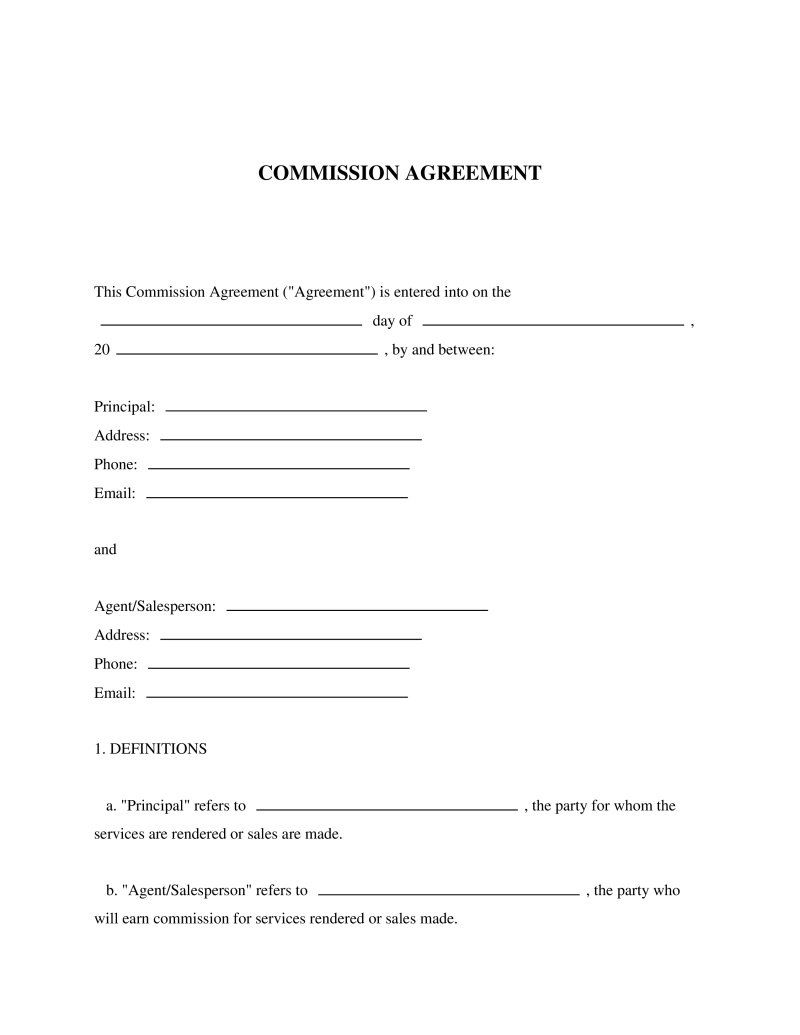A Commission Agreement outlines the terms under which one party agrees to pay another for services rendered, typically in sales or referrals.
Principal Name
Enter the full legal name of the Principal or company.

Table of Contents
What is a Commission Agreement?
A Commission Agreement is a legal contract that establishes the terms under which one party (the 'agent') will be paid for services rendered on behalf of another (the 'principal'). Typically, this payment takes the form of a commission, a percentage of the sales or revenue generated by the agent's efforts. This document is crucial for both parties to ensure clarity regarding compensation, responsibilities, and conditions of the working relationship. Businesses across various industries require this agreement to formalize the dynamics of commission-based partnerships, ensuring that agents are motivated to perform while protecting the interests of the principal. From real estate agencies to sales-driven enterprises, it serves as a foundational tool for managing external partnerships and incentivizing performance.
Key Features
Important Provisions
- Commission Structure: Details how commissions are calculated, payment intervals, and any caps or thresholds that apply.
- Duties and Obligations: Clearly outlines what is expected from both parties throughout the term of the agreement.
- Confidentiality: Protects trade secrets and proprietary information by restricting its disclosure beyond the terms of partnership.
- Termination: Establishes how either party can terminate the agreement and outlines any required notice periods or final settlements.
- Dispute Resolution: Specifies methods for resolving disputes, whether through arbitration, mediation, or legal proceedings.
Pros and Cons
Pros
- +Facilitates clear communication between parties regarding expectations and compensation, reducing potential conflicts.
- +Incentivizes agents by directly linking their compensation to their performance, potentially boosting sales and revenue.
- +Provides legal protection for both parties by clearly outlining rights and responsibilities in a binding document.
- +Enables businesses to expand their market reach through partnerships without taking on additional full-time employees.
- +Offers flexibility to adjust commission rates and structures based on evolving business needs and market conditions.
Cons
- -Requires careful negotiation to ensure fair terms for both parties, which can be time-consuming.
- -May lead to dependency on commission-based partners for revenue generation, affecting direct control over sales strategies.
- -Potential misunderstandings or disputes over commission calculations if not clearly defined in the agreement.
Common Uses
- Real estate transactions where agents earn commissions on property sales or leases.
- Sales roles within companies, compensating employees based on performance metrics.
- Affiliate marketing arrangements where individuals or companies earn commissions by referring customers.
- Brokerage services across finance, insurance, and other sectors involving transaction-based compensation.
- Consultancy services where fees are tied to specific outcomes or revenue benchmarks.
- Artistic or literary representation where agents receive a percentage of earnings from deals they negotiate.
Frequently Asked Questions
Do you have a question about a Commission Agreement?
Example questions:
Not the form you're looking for?
Try our legal document generator to create a custom document
Community Discussion
Share your experience and help others
Legal Notice: Comments are personal opinions and do not constitute legal advice. Always consult a qualified attorney for matters specific to your situation.
Comments (0)
Leave a Comment
No comments yet. Be the first to comment!